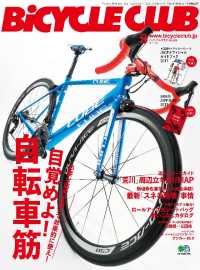- ホーム
- > 洋書
- > 英文書
- > Nature / Ecology
Full Description
This 2-volume book highlights cutting-edge ecodesign research and covers broad areas ranging from individual product and service design to social system design. It includes business and policy design, circular production, life cycle design and management, digitalization for sustainable manufacturing, user behavior and health, ecodesign of social infrastructure, sustainability education, sustainability indicators, and energy system design. Featuring selected papers presented at EcoDesign 2021: 12th International Symposium on Environmentally Conscious Design and Inverse Manufacturing, it also includes diverse, interdisciplinary approaches to foster ecodesign research and activities. In the context of Sustainable Development Goals (SDGs), in particular SDG 12 (Responsible Consumption and Production), it addresses design innovations for sustainable value creation, considering technological developments, legislation, and consumer lifestyles. Further, the book discusses the conceptof circular economy, which aims to develop circular business models for resource efficient society by taking advantage of digital technologies including artificial intelligence, internet of things, digital twin, data analysis and simulation.
Written by experts from academia and industry, Volume 2 focuses on the sustainability assessment of product lifecycle, waste management, material circularity and energy efficiency, food and agriculture, user behavior and health, and transportation. The methods, tools, and practices described are useful for readers to facilitate value creation for sustainability.
Contents
1. The Life Cycle Assessment of Digital Professional Photography in Iran.- 2. Environmental evaluation of Toner Cartridge Remanufacturing.- 3. Life cycle resource use of air conditioner from the perspective of total material requirement.- 4. Resource efficiency quantification of a long-life product considering service activities through lifecycle.- 5. A study on Circular Fashion: Profitability and Environmental Impact Analysis.- 6. A Hydrogen Fueling Performance Analysis of Metal Hydride For a Fuel Cell Assisted Bicycle Using GF-08 Cooling System.- 7. State prediction and parts replacement of a manipulator based on assembly model.- 8. Adapting Lifecycle Impact Assessment Methodology to Quantify New Product Design Risks.- 9. Estimation of Greenhouse Gas Emissions from Wastewater Treatment in Ulaanbaatar and a Potential Approach for Emission Reductions.- 10. Plastic waste trade flows inthe Southern African Region from 2016 to 2020.- 11. Identification of most affected impact categories of waste water-based biogas production and use.- 12. Evaluation of evolving waste management strategies in Addis Ababa city, Ethiopia: A life-cycle assessment approach.- 13. Comparative analysis of wastewater activated sludge recycling system in China: environmental and economic performances.- 14. Evaluation of micro-level circularity indicators using agent-based modelling.- 15. Energy savings evaluation based on utilizing Recycled PET Bottles in concrete blocks in Iran.- 16. Techno-economic assessment of recycling obsolete two-wheelers in ASEAN : the case of Myanmar and Cambodia.- 17. Consideration of CO2 emission reduction potential by utilizing recycled automobile parts in China.- 18. Evaluation of decarbonization based on environmental footprint indicators in the power generation in Japan.- 19. GIS-Based Analysis of Energy Recovery Potential from Oil Palm Empty Fruit Bunch in Southern Thailand.- 20. Discussion on the Reuse of Suboptimal Food through the Perspective of Sustainable Food Circle.- 21. Environmental Impact Assessment of Tomato Consumption Using Life Cycle Assessment from Cultivation to Cooking.- 22. Food Loss and Waste: Mixed analysis from the Circular Food Economy.- 23. Application of disability adjusted life years in risk assessment for total human mercury exposure in China and Japan - a meta-analysis.- 24. COVID19 Pandemic Impact on Energy Consumption - A Survey of College Students in Japan.- 25. Modelling Customer Preference for Sustainability Information via Clustering Analysis.- 26. Smartphone App Design for Product Use Sustainability Evaluation.- 27. Undertaking Scenario Analysis of the Diffusion of Car Sharing Services: A Case Study in Bangkok, Thailand.- 28. Environmental, health, and economic co-benefits assessment of the electrification of public transport in Delhi (India).- 29. A scenario analysis of transportation system in Vietnam based on life cycle simulation.-








